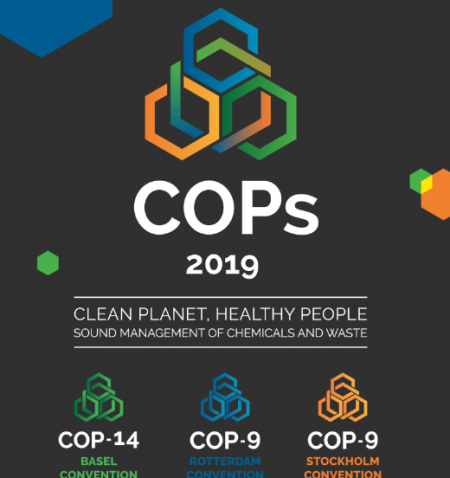Basel COP-14 promotes management of Hazardous Wastes 14/05/2019 – Posted in: Daily News – Tags: climate change, COP 14, COP 9, hazardous waste, UNCCC, waste management
Basel COP 14 promotes management of Hazardous Wastes
For: Preliminary & Mains
Topics covered: COP-14, Outcome of meeting, Basel convention – its principles, Waste covered by Basel Convention, UNFCCC, Rotterdam Convention COP 9 and Stockholm Convention on COP 9.
News Flash
- COP 14 is taking place in Geneva, Switzerland, from 29 April to 10 May 2019.
- It is held jointly and back-to-back with Rotterdam Convention COP 9 and Stockholm Convention on COP 9.
Meeting
The 14th meeting of the Conference of the Parties (COP 14) to the Basel Convention on the Control of Transboundary Movements of Hazardous Wastes and their Disposal is addressing environmentally sound management (ESM) of wastes through the development of technical guidelines on waste from electronics, persistent organic pollutants (POPs), lead acid batteries and mercury, as well as certain hazardous waste treatment methods.
Parties are also discussing, inter alia, classification and hazard characterization of wastes, national reporting, electronic approaches to the notification and movement documents, marine plastic litter and microplastics, waste containing nanomaterials, and legal, compliance and governance matters.
COP 14 is taking up various matters related to implementation of the Convention, including the strategic framework, entry into force of the Ban Amendment and the Cartagena Declaration on the Prevention, Minimization and Recovery of Hazardous Wastes and Other Wastes.
Rotterdam Convention COP-9 & Stockholm Convention on COP-9
Venue: Geneva International Conference Centre (CICG), Geneva, Switzerland.
Highlights: The ninth meeting of the Conference of the Parties to the Rotterdam Convention (RC COP-9) will be held back to back with the fourteenth meeting of the Conference of the Parties to the Basel Convention (BC COP-14) and the ninth meeting of the Conference of the Parties to the Stockholm Convention (SC COP-9) from 29 April to 10 May 2019, in Geneva.
- The theme of the meetings will be ” Clean Planet, Healthy People: Sound Management of Chemicals and Waste”.
- The meetings will include joint sessions covering matters of relevance to at least two conventions and separate sessions of the meetings of the each of the three COPs.
- The meetings will not feature a high-level segment.
Waste covered by Basel Convention
- Toxicity
- Corrosivity
- Ignitability
- Reactivity
- Eco-toxicity
- Clinical wastes
- Mining wastes
- Industrial wastes
- Agricultural wastes
- End of life equipments and commodities
- Asbestos, PCB equipments
- Stockpiles, Batteries
- E-wastes, Ships etc.
Based on the 11th meeting of the Open-ended Working Group (OEWG11) of the Basel Convention, held from 3-6 September 2018, in Geneva, Switzerland, the main outcomes for consideration by COP 14 include:
- A proposal to set up a new partnership on plastic wastes;
- Possible amendments to the Convention’s annexes in relation to solid plastic wastes;
- Further development of technical guidelines on e-waste;
- Incineration on land and specially engineered landfills;
- Additions to the Convention’s Toolkit on Environmentally Sound Management of Wastes;
- Consultations on four draft guidance documents;
- Enhanced cooperation with the World Customs Organization (WCO)
Basel Convention
- The Basel Convention was adopted in 1989, and entered into force on 5 May 1992.
- It was created to address concerns over the management, disposal and transboundary movement of the estimated 400 million tonnes of hazardous wastes that are produced worldwide each year.
- There are currently 187 Parties and 53 signatories to the Convention.
Principles of the Basel Convention
Transboundary movements of hazardous wastes should be:
- reduced to a minimum;
- managed in an environmentally sound manner;
- treated and disposed of as close as possible to their source of generation;
- and minimized at the source.
United Nations Climate Change Conference
The United Nations Climate Change Conferences are yearly conferences held in the framework of the United Nations Framework Convention on Climate Change (UNFCCC).
They serve as the formal meeting of the UNFCCC Parties (Conference of the Parties, COP) to assess progress in dealing with climate change, and beginning in the mid-1990s, to negotiate the Kyoto Protocol to establish legally binding obligations for developed countries to reduce their greenhouse gas emissions.
Source: IISD
You can follow us on LinkedIn and for more updates related to UPSC IAS Preparation, Like our Facebook Page and subscribe our Diligent IAS Youtube Channel
Also Read Related Daily News

